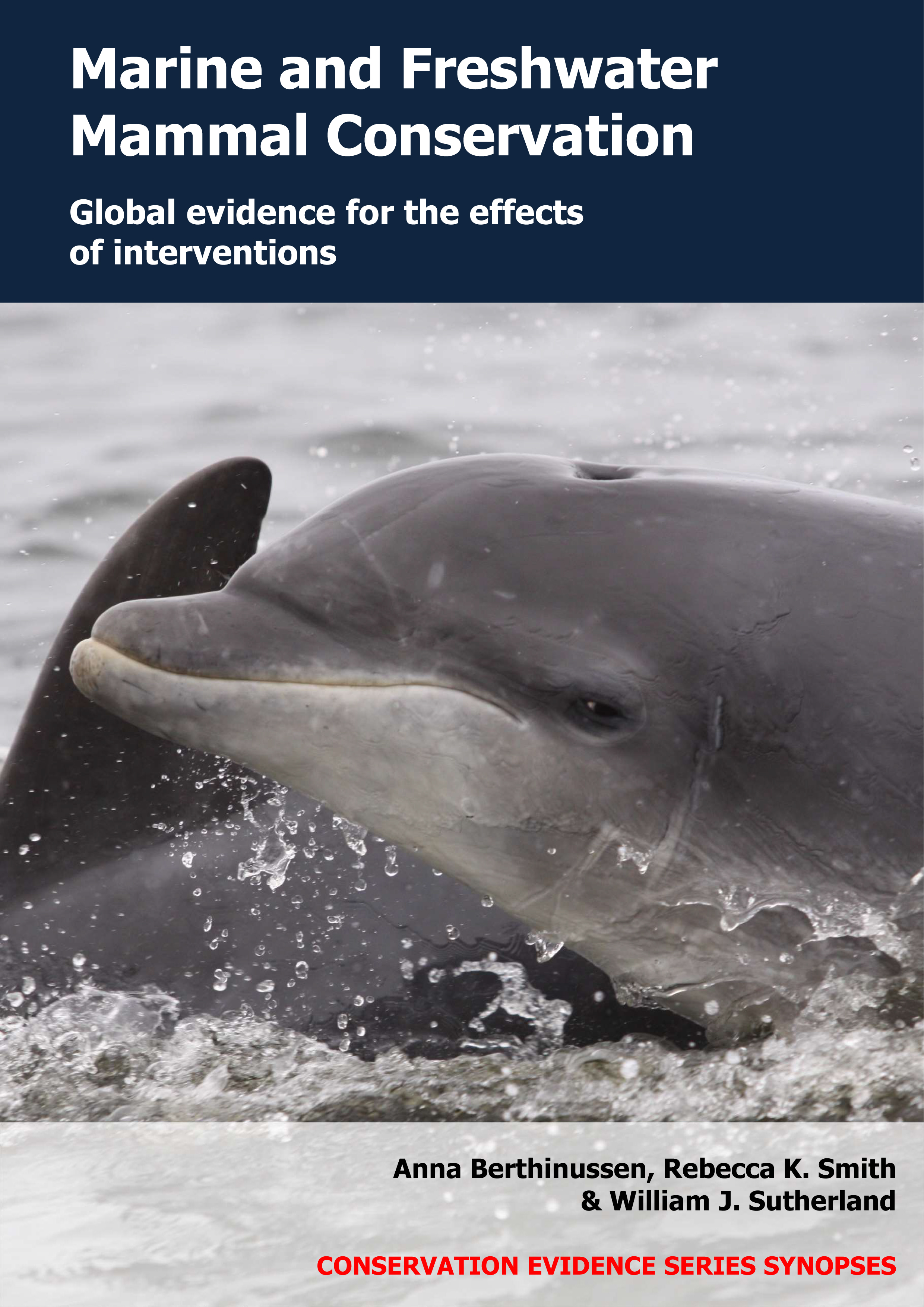Actions to conserve biodiversity
We have summarised evidence from the scientific literature about the effects of actions to conserve wildlife and ecosystems.
Review the evidence from the studies
Not sure what Actions are? Read a brief description.
Search for evidence
e.g. "frogs chytrid"
180 Actions found
Refine
Hide
180 Actions found
Download Actions
| 0 selected |
|
Order results by:
| Action | Effectiveness | Studies | Category | |
|---|---|---|---|---|
|
Introduce alternative food sources to replace marine and freshwater mammal meat Action Link |
No evidence found (no assessment) | 0 |
|
|
|
Deploy fishing gear at times when mammals are less active Action Link |
No evidence found (no assessment) | 0 |
|
|
|
Limit the number of fishing vessels or fishing days in an area Action Link |
No evidence found (no assessment) | 0 |
|
|
|
Limit the length of fishing gear in an area Action Link |
No evidence found (no assessment) | 0 |
|
|
|
Introduce and enforce legislation to prevent intentional killing of mammals at wild fisheries Action Link |
No evidence found (no assessment) | 0 |
|
|
|
Introduce and enforce regulations to prevent the use of harmful deterrents on mammals at wild fisheries Action Link |
No evidence found (no assessment) | 0 |
|
|
|
Enforce legislation to prevent the trafficking and trade of marine and freshwater mammal products Action Link |
No evidence found (no assessment) | 0 |
|
|
|
Restrict capture of marine and freshwater mammals for research or aquariums and zoos Action Link |
No evidence found (no assessment) | 0 |
|
|
|
Reduce duration of time fishing gear is in the water Action Link |
No evidence found (no assessment) | 0 |
|
|
|
Use weakened fishing gear Action Link |
No evidence found (no assessment) | 0 |
|
|
|
Use sinking lines instead of floating lines Action Link |
No evidence found (no assessment) | 0 |
|
|
|
Use a smaller mesh size for fishing nets Action Link |
No evidence found (no assessment) | 0 |
|
|
|
Limit size of trawl net openings Action Link |
No evidence found (no assessment) | 0 |
|
|
|
Retain offal on fishing vessels instead of discarding overboard Action Link |
No evidence found (no assessment) | 0 |
|
|
|
Introduce alternative treatments to reduce the use of marine and freshwater mammals in traditional medicine Action Link |
No evidence found (no assessment) | 0 |
|
|
|
Introduce alternative income sources to reduce marine and freshwater mammal exploitation and trade Action Link |
No evidence found (no assessment) | 0 |
|
|
|
Introduce alternative sources of bait to replace the use of marine and freshwater mammals Action Link |
No evidence found (no assessment) | 0 |
|
|
|
Inform local communities and fishers about the negative impacts of hunting to reduce the killing of marine and freshwater mammals Action Link |
No evidence found (no assessment) | 0 |
|
|
|
Educate local communities and fishers on mammal protection laws to reduce killing of marine and freshwater mammals Action Link |
No evidence found (no assessment) | 0 |
|
|
|
Introduce and enforce regulations for sustainable hunting of marine and freshwater mammals for traditional subsistence and handicrafts Action Link |
No evidence found (no assessment) | 0 |
|
|
|
Introduce permits or licences for recreational watersports Action Link |
No evidence found (no assessment) | 0 |
|
|
|
Create designated areas or access points for recreational activities Action Link |
No evidence found (no assessment) | 0 |
|
|
|
Introduce regulations for flying drones over marine and freshwater mammals Action Link |
No evidence found (no assessment) | 0 |
|
|
|
Use passive listening devices to detect mammals and prompt fishing vessels to move away Action Link |
No evidence found (no assessment) | 0 |
|
|
|
Retain buoys and lines at the sea floor or river bed when not hauling Action Link |
No evidence found (no assessment) | 0 |
|
Download Actions
| 0 selected |
|

Marine and Freshwater Mammal Conservation - Published 2021
Marine and Freshwater Mammal Synopsis
Watch this search
If you are familiar with RSS feeds, please click the button below to retrieve the feed URL:
RSS feed for this searchIf you are unfamiliar with RSS feeds, we would suggest reading this BBC article.
Unfortunately, due to the number of feeds we have available, we cannot provide e-mail updates. However, you could use tools such as Feed My Inbox to do this for you.
What are 'Individual studies' and 'Actions'?
Individual studies
An individual study is a summary of a specific scientific study, usually taken from a scientific journal, but also from other resources such as reports. It tells you the background context, the action(s) taken and their consequences.
If you want more detail please look at the original reference.
Actions
Each action page focuses on a particular action you could take to benefit wildlife or ecosystems.
It contains brief (150-200 word) descriptions of relevant studies (context, action(s) taken and their consequences) and one or more key messages.
Key messages show the extent and main conclusions of the available evidence. Using links within key messages, you can look at the paragraphs describing each study to get more detail. Each paragraph allows you to assess the quality of the evidence and how relevant it is to your situation.
Where we found no evidence, we have been unable to assess whether or not an intervention is effective or has any harmful impacts.





)_2023.JPG)














